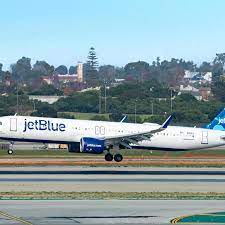JetBlue Airways recently announced significant route adjustments, marking its strategic response to challenges following the blockage of its proposed acquisition of Spirit Airlines. In a bid to streamline operations and optimize resources, the airline is discontinuing several unprofitable routes and withdrawing from five cities across the United States and South America. This decision comes amidst ongoing efforts to mitigate operational constraints and enhance financial performance in a dynamic aviation landscape.
The airline’s move to exit Kansas City, Missouri, and Newburgh, New York, underscores its commitment to rationalizing its route network and focusing on markets that yield sustainable profitability. Additionally, the decision to withdraw from international destinations such as Bogotá, Colombia; Quito, Ecuador; and Lima, Peru, reflects a strategic realignment aimed at allocating resources to routes with stronger demand and revenue potential.
Dave Jehn, JetBlue’s vice president of network planning and airline partnerships, emphasized the importance of optimizing fleet utilization and minimizing disruptions for passengers. With a portion of its aircraft grounded due to Pratt & Whitney engine inspections, JetBlue faces operational challenges that necessitate prudent route management and resource allocation. By reducing frequencies on underperforming routes and reallocating aircraft to more lucrative markets, the airline aims to enhance operational efficiency and minimize the risk of delays.
However, the route adjustments extend beyond operational considerations. Following the setback of its proposed merger with Spirit Airlines, JetBlue is recalibrating its growth strategy and reevaluating its network expansion plans. The failed merger bid, which faced opposition from federal antitrust authorities, prompted JetBlue to reassess its approach to market consolidation and expansion. Consequently, the airline is shifting its focus towards organic growth and market optimization, prioritizing markets where it can achieve sustainable profitability and competitive advantage.
The decision to scale back operations in key hubs like Los Angeles reflects JetBlue’s strategic pivot in response to market dynamics and regulatory challenges. Despite the setback, the airline remains committed to serving its customers and maintaining operational resilience amidst evolving industry trends. With a focus on route profitability and operational efficiency, JetBlue aims to navigate the complexities of the aviation landscape while delivering value to its stakeholders.
As JetBlue embarks on this strategic realignment, the airline seeks to strike a balance between operational agility and long-term sustainability. By optimizing its route network, reallocating resources, and prioritizing markets with growth potential, JetBlue aims to position itself for success in a competitive aviation market. As the airline navigates the challenges and opportunities ahead, its commitment to delivering exceptional service and value remains unwavering, reflecting its dedication to customer satisfaction and operational excellence in the ever-evolving aviation industry.
